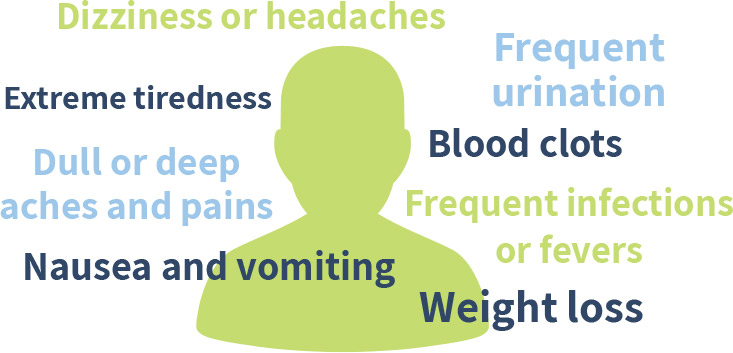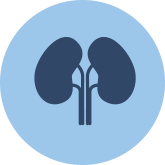How Multiple Myeloma Might Make You Feel
Multiple myeloma affects every person differently. Some people experience no symptoms at all, while others may live with common symptoms including:


Multiple myeloma is a cancer of the blood, but it may affect many parts of your body. Be aware of these common symptoms and talk to your doctor about how you’re feeling.

Pain and bone problems
One of the most common symptoms of multiple myeloma is bone pain. In fact, 7 out of 10 people experience pain related to multiple myeloma.
When you experience pain, your healthcare team will work to pinpoint exactly where your pain is occurring—and what could be causing it. Once the cause of your pain is determined, your healthcare team can help you find ways to manage it.
Just because you have multiple myeloma doesn’t mean you need to suffer with pain. Most pain can be controlled—and pain control is a part of your cancer treatment plan. Talk to your healthcare team about creating a pain management plan that’s right for you.

Infections
Multiple myeloma affects a type of white blood cell called a plasma cell. Normally, plasma cells help the body fight infection by making antibodies. In multiple myeloma, plasma cells make abnormal antibodies and can’t do their job properly.
Be alert for any signs of infection, including a temperature of 100.5°F or higher and flu-like symptoms such as body aches and fatigue, with or without fever.
Take charge of your health by taking steps to help prevent infection:

Fatigue
People living with multiple myeloma can feel extremely tired even if they’re getting enough sleep. This condition is called fatigue. It’s important to recognize the symptoms of fatigue and to report those symptoms to your healthcare team.
When you are fatigued, you may feel a total lack of energy, more confused than normal, or very tired even after sleeping. You may feel too tired to do normal activities.
Your healthcare team may be able to help you manage your symptoms of fatigue. Try to perform daily activities at the time of day when you have the most energy. Rest when you need to and don’t be afraid to ask for help.

Kidney problems
Multiple myeloma can take a toll on your kidneys. Kidney problems may develop for a variety of reasons. The primary cause is too much protein in the blood. Kidney problems may also be caused by infection or too much calcium in the blood.
Symptoms of kidney damage may include fatigue, weakness, difficulty thinking, shortness of breath, itching, or leg swelling. If you notice these or any other unusual symptoms, be sure to tell your doctor right away.
Patients with kidney problems may or may not have symptoms. Doctors will perform routine blood and urine tests to monitor how kidneys are working.

Nerve problems
Sometimes, multiple myeloma can damage nerves, causing a condition called peripheral neuropathy.
Sometimes, the abnormal proteins produced by myeloma cells can damage nerves. This damage can lead to weakness and numbness and sometimes a “pins and needles” sensation. This is also called peripheral neuropathy.
Avoid things that make your peripheral neuropathy worse, such as hot or cold temperatures or snug clothes or shoes. Talk with your doctor about things you can do to help you cope with the symptoms of peripheral neuropathy.
Remember, you are an important part of your healthcare team. Always work together to best manage your symptoms.